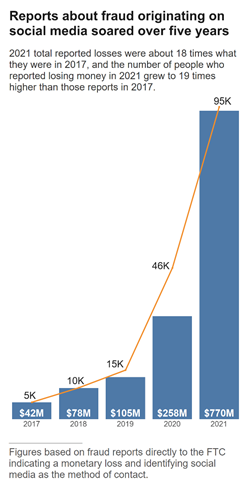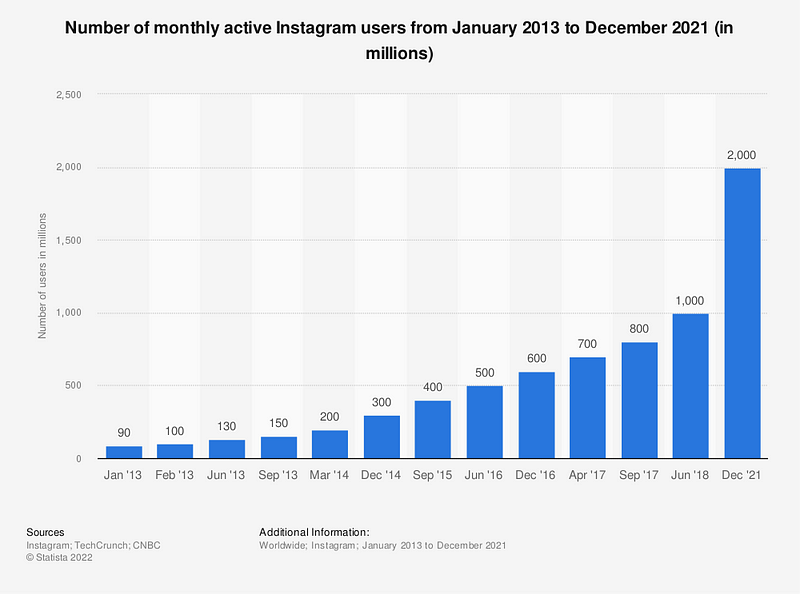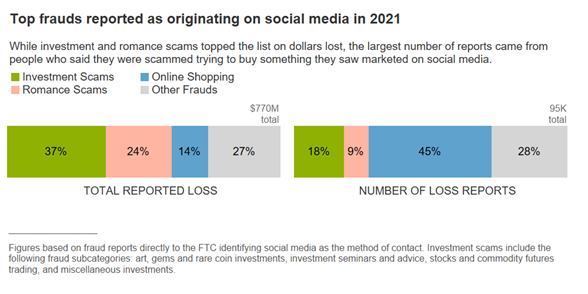Tips to spot an online scam at first glance
From elder fraud to romance scams, the Internet is full of phishing and fraud incidents. Malicious actors online are trying to blackmail, abuse, or take advantage of their victims by stealing money or sensitive data. According to the US Federal Trade Commission, reported losses due to social media scams exceeded 770M$ in 2021 with an increase of 25% from the previous year [1].

Instagram’s popularity has been growing over the years. With more than 2 billion active users on the platform, Instagram is a hotbed for scammers to target unsuspecting users. Being one of the most used social media networks, Instagram has become the new key weapon in scammers’ repository. In this article, we are going to break down some of the popular scams on Instagram and how to avoid them.

Scams on Instagram
By using fake identities and accounts, fraudsters can impersonate credible businesses and individuals to gain personal or financial information of social media users that fall victim to impersonation attacks.
Phishing scams
This is by far the most commonly used scamming method. With the increasing use of Direct Messages (DMs) and posts on social media platforms, phishing has now become social. Read more in this article: Phishing is not just email — it’s social
Scammers can send you messages with clickable links to hack your account or ask you directly for confidential information, e.g., the email address and phone number associated with your bank account.

Investment and loan scams
Scammers may lure you to send them a specific amount of money which they promise to convert into a larger sum by investing the money. For example, they can promise to invest $200 to grow into $2000 or grow at a 30% rate of return over a few months’ time. However, once you transfer the fund, you may not be able to contact the investor, eventually losing the so-called investment. Such investment scams have become more widespread recently due to the growing popularity of bitcoin and cryptocurrency in general.
Likewise, those scammers can offer instant loans via posts or DMs at an interest rate that is smaller than what you can get from your bank or other public sources. However, once you sign up with the scammer, they ask to send a few hundred dollars in advance to initiate the loan or to pay a loan origination fee. Once you transfer that money, it is lost.
Giveaways and lottery scams
Scammers often contact you from impersonated accounts of trusted agencies and influencers. They will claim that you have won a lottery or a giveaway, e.g. credit cards or coupons , and ask you for your financial information to complete the process of transferring the winnings.
Fake collaborations and sponsors
Another method used by attackers hiding behind fake names is to approach you as a collaborator and ask you to promote a certain company’s products and services or work in collaboration projects and pay them afterward.
Romance scams
Fraudsters employ a false online persona to gain the confidence of a victim looking for a friend or partner. They deceive and steal from the victim by creating an illusion of a romantic or personal connection. They frequently request money from their targets in order to pay for an airline ticket to visit the target person, medical fees, visa, or other formal travel documents.
Warning signs of a scam attack on Instagram
- DMs from friends and family asking you to click urgently on a link
- Unknown people asking you for money
- People offering loans and giveaways and asking for credentials
- Non-verified accounts of popular businesses and influencers
- An account offering discounts on their items that are too good to be true
- Accounts with no profile picture or new accounts with no location
How to avoid scammers
To protect your personal or business account from fraud on Instagram, consider following these tips:
- Limit your social network. If you have a personal account, make it private. Set some restrictions on your privacy online by changing your settings to ensure that only persons you know can see your posts and send you direct messages.
- Make your account more secure by adding two-factor authentication, also known as 2FA. This feature fortifies your defense against online scams.
- Stay away from skeptical links sent by people you don’t know or from unverified businesses
- Do some research before responding to strangers’ accounts: their posts, bio, and how long they have been on the platform.
- Before you purchase anything from a company on Instagram, search online for its name and if it’s related to a scam.
What to do if you got scammed on Instagram
After stealing your information, scammers can impersonate your social media account, use your financial credentials to log into your bank account, and/or send malware and phishing emails to people in your connection list. If you think you may have fallen victim to an Instagram scam, you should take action quickly:
- Change your account password before the scammer does. If you gave them any other information such as banking credentials, email, or other social media accounts, change the passwords of those accounts too.
- Log into your bank account. If you spot an unusual activity on your account, freeze your account and call your bank to report the activity.
- Report the scammer’s account to Instagram.
- If you got involved in serious threats and losses, consider reporting the fraud to the federal government on their website: https://reportfraud.ftc.gov
How Eydle can protect your brand from online scams
At Eydle, we monitor, detect, and take down impersonation accounts of individuals and brands. Our AI-powered analysis engine offers 24×7 monitoring and detection of impersonation attacks that can threaten your business and reputation among your followers and customers online.
Have questions or comments? Contact us at [email protected] or visit Eydle’s website www.eydle.com.
References
[1] “Social media a gold mine for scammers in 2021,” Federal Trade Commission, Jan. 25, 2022. http://www.ftc.gov/news-events/data-visualizations/data-spotlight/2022/01/social-media-gold-mine-scammers-2021.




